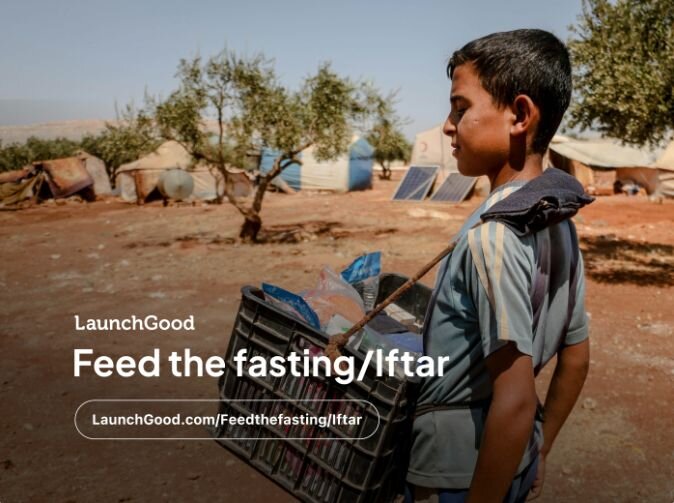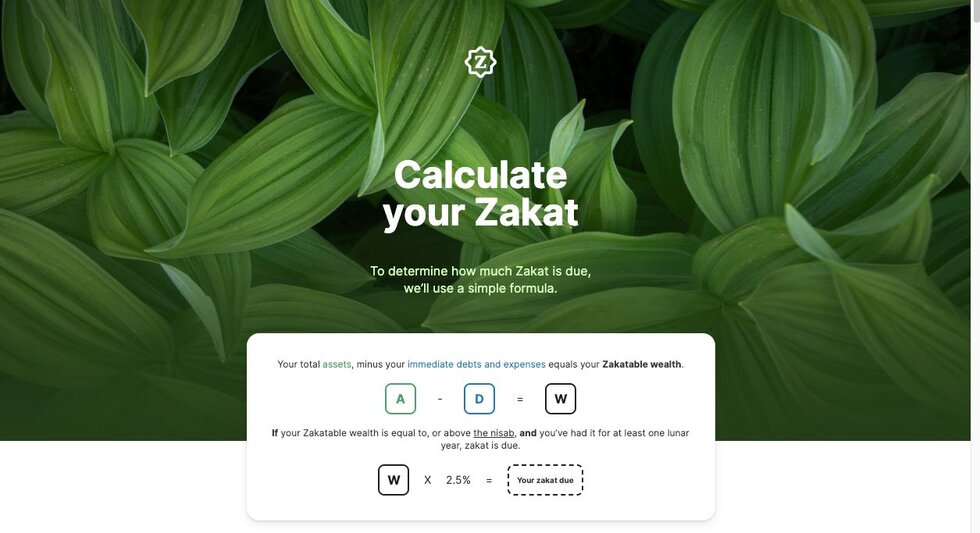Home
>
Fidya and kaffarah
November 17, 2024
Fidya and kaffarah: A guide to payments for missed fasts in Ramadan
By Yusuf Jaffar
•
3 min read

In Islam, fasting during Ramadan is a spiritual obligation for all eligible Muslims. However, there are instances where fasting may be missed due to valid reasons such as illness, travel, or other exceptional circumstances. Islamic teachings provide compensatory actions in such cases through fidya and kaffarah.
This guide explores three key aspects of fidya and kaffarah:
What is fidya and kaffarah in Islam? This section explains their meanings, significance, and when they apply to missed fasts.
How to calculate fidya and kaffarah for Ramadan 2024, providing guidance on the amounts to pay.
Making fidya and kaffarah donations online, covering how to fulfill these obligations through LaunchGood.
What is fidya in Islam?
In Islam, fidya and kaffarah are two distinct forms of expiation related to fasting, particularly during Ramadan. Both address different situations and are rooted in the principles of accountability and compassion in Islamic teachings. Here’s an explanation of each, along with their purpose, rulings, and key differences.
Fidya: compensatory payment for missed fasts
Definition:
Fidya is a compensatory payment made by individuals who are unable to fast during Ramadan due to valid reasons such as chronic illness, old age, pregnancy, or breastfeeding. These individuals are permanently exempt from fasting and cannot make up the missed fasts later.
Purpose:
Fidya allows such individuals to fulfill their religious obligation by helping the poor and needy. It serves as a form of charity that benefits both the giver and the receiver.
How it works:
Fidya involves feeding one poor person for each day of fasting missed. This is typically calculated based on the cost of providing two meals or an equivalent monetary amount. For example, the fidya amount for 2025 may vary depending on local food costs, and organizations on LaunchGood often provide updated rates.
Qur'anic basis:
Allah says in the Qur'an:
“And as for those who can fast with difficulty, they have (a choice either to fast or) to feed a poor person (for every day). But whoever does good of his own accord, it is better for him. And that you fast is better for you if only you know.” (Surah Al-Baqarah 2:184)
Find iftar fundraisers below


What is kaffarah in Islam?
Kaffarah is a penalty imposed on individuals who deliberately break their fast during Ramadan without a valid reason, such as eating, drinking, or engaging in sexual relations during fasting hours. Kaffarah also applies to breaking oaths or committing certain other religious violations.
Purpose:
Kaffarah serves as atonement for the deliberate violation of fasting rules or other religious obligations. It is a way to seek forgiveness and make amends for the transgression.
How it works:
For breaking a fast intentionally during Ramadan, kaffarah involves:
Freeing a slave (historically applicable).
If unable, fasting for 60 consecutive days.
If unable to fast, feeding 60 poor people.
For breaking an oath, kaffarah involves:
Feeding 10 poor people, clothing them, or freeing a slave.
If none of these are possible, fasting for three consecutive days.
Qur'anic basis:
Allah says:
“But those who can fast (but) with hardship, they have to compensate by feeding a poor person for each day (missed).” (Surah Al-Baqarah 2:184)
Key differences between fidya and kaffarah
While both fidya and kaffarah involve compensatory actions, they differ significantly in their purpose and application:
Reason:
Fidya: Applicable to those unable to fast due to valid reasons like chronic illness or old age.
Kaffarah: Imposed for deliberate violations of fasting rules or other religious obligations.
Obligation:
Fidya: Feeding one poor person per missed day of fasting.
Kaffarah: Fasting 60 consecutive days or feeding 60 poor people per broken fast.
Applicability:
Fidya: For those who cannot make up missed fasts later.
Kaffarah: For intentional violations requiring atonement.
The calculation of fidya and kaffarah in Ramadan 2024 varies depending on the country and the cost of feeding a needy person locally. Both obligations ensure that missed or broken fasts are compensated in accordance with Islamic teachings while supporting the less fortunate. Below is a detailed explanation of how these amounts are determined and applied.
Find food fundraisers below.

How to calculate fidya and kaffarah for Ramadan
Fidya calculation
Who owes fidya?
Fidya is owed by individuals who cannot fast due to valid reasons, such as chronic illness, old age, pregnancy, or breastfeeding, and are unable to make up the missed fasts later.
How is fidya calculated?
The fidya amount is equivalent to the cost of feeding one poor person per missed fasting day. The cost varies globally based on local meal prices:
Australia: Fidya is $18 AUD per day in 2024, reflecting local meal costs.
United States: Fidya is approximately $5 USD per day based on last years rate.
United Kingdom: Fidya is around £5 per day, based on last years rate.
Regions with lower costs (e.g., Iraq): Fidya may be as low as $1.25 USD per day, based on the cost of staple foods like 750 grams of rice or wheat.
Example calculation:
To calculate fidya, multiply the number of missed fasting days by the local fidya rate.
If someone missed 10 fasts in the UK, they would pay £50 (10 days × £5).
Kaffarah calculation
Who owes kaffarah?
Kaffarah is owed by individuals who deliberately break their fast during Ramadan without a valid reason. This applies to acts like eating, drinking, or engaging in prohibited activities during fasting hours.
How is kaffarah calculated?
The kaffarah obligation requires either:
Fasting for 60 consecutive days for each intentionally broken fast.
Feeding 60 poor people for each missed fast if fasting is not possible.
The cost of kaffarah is determined by multiplying the fidya rate by 60, as it involves feeding 60 people.
Key notes
Fidya and kaffarah recipients: Both obligations must be given to the poor and needy, ensuring they directly benefit those in need.
Regional differences: Fidya and kaffarah rates vary based on local economic conditions and food costs. Charitable organizations often provide updated rates for their regions.
Fidya and kaffarah recipients: Both obligations must be given to the poor and needy, ensuring they directly benefit those in need.
Regional differences: Fidya and kaffarah rates vary based on local economic conditions and food costs. Charitable organizations often provide updated rates for their regions.
Consult local authorities: It is recommended to seek guidance from local Islamic scholars or charitable organizations to ensure accuracy and proper distribution of payments.

Paying your fidyah and kaffarah on LaunchGood.com
If you're looking to make a meaningful impact by providing food to beneficiaries on LaunchGood.com, there are several types of campaigns you can support. These campaigns are designed to reach specific groups in need, ensuring your contribution helps the most vulnerable. Below are the key types of beneficiaries commonly targeted by food donation initiatives:
1. Poor and needy (faqir and miskin)
Many campaigns focus on assisting poor and needy individuals who cannot afford basic meals. These include:
Food banks or meal distribution programs aimed at supporting low-income families.
Initiatives such as "Feed the Hungry" or "Food Basket" campaigns, which provide essential food supplies to impoverished communities.
Supporting these campaigns ensures that your donation directly helps those struggling to meet their basic nutritional needs.
2. Refugees
Refugee families, including Afghan, Syrian, Palestinian, and Somali communities, often face displacement and food insecurity. Campaigns targeting refugees typically provide:
Food baskets containing essential supplies.
Warm meals distributed in refugee camps.
Examples include campaigns offering Eid meat or daily rations to sustain refugee families during challenging times.
3. Single mothers and families in need
Single mothers, often struggling to provide for their children, are common beneficiaries of food-related campaigns. These initiatives frequently include:
Family gift packages with essential groceries.
Ready-to-eat meal distributions that help single-parent households manage their day-to-day nutritional needs.
By supporting these campaigns, you can help alleviate the burden on families facing financial hardships.
4. Migrant workers
Migrant workers, particularly those affected by economic challenges or job losses, are another significant group of beneficiaries. Food-related campaigns for migrant workers often provide:
Nutritional aid to sustain them during times of financial distress.
Medical care alongside food supplies to address their holistic needs.
5. Orphans
Orphans frequently lack stable sources of nutrition, making them a high-priority group for food distribution efforts. Campaigns targeting orphans may include:
Regular meal distributions at orphanages.
Specific mentions of orphan care as part of their beneficiary list, ensuring a consistent source of nourishment for children in need.
Featured fundraisers
Discover 1.5K more
Join our newsletter
Join our community of 700k subscribers
Explore more